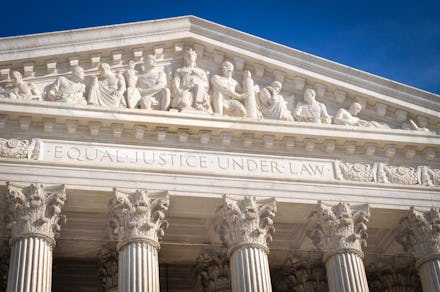The Supreme Court is about to determine the rights of same-sex couples looking to adopt

Across the nation, conservative lawmakers continue to push anti-LGBTQ legislation. Already emboldened by the Trump administration, those lawmakers may be further strengthened by a pending federal appeal. The Supreme Court announced this week that one of its newest cases could be a major blow to LGBTQ rights — and potentially undo a landmark decision from the 1990s.
On Monday, the Supreme Court announced its decision to hear a case brought forth by Catholic Social Services, a religious organization based in Philadelphia that helps with foster care. The case of Fulton v. Philadelphia began in March 2018 after an article in The Philadelphia Inquirer exposed that CSS refused to place foster children in homes with same-sex couples.
This became an issue because Philadelphia's Department of Human Services provides funding to CSS. Rue Landau, the executive director of the Philadelphia Commission on Human Relations, told The Philadelphia Inquirer that CSS was likely in violation of the city's fair practices ordinance, which prohibits discrimination based on sexual orientation and is included in all city contracts.
Philadelphia ended up cutting CSS's contract for placing children in foster homes. That led to the agency suing the city, claiming that Philadelphia was violating CSS's First Amendment right to religious freedom.
"As a Catholic agency, CSS cannot provide written endorsements for same-sex couples which contradict its religious teachings on marriage," the group wrote in its petition to the Supreme Court. "The mayor, city council, Department of Human Services, and other city officials have targeted CSS and attempted to coerce it into changing its religious practices.”
The Supreme Court is additionally being asked to reconsider a 1990 ruling out of Oregon known as Employment Division v. Smith. The landmark decision placed limitations on when religious reasoning could be used to defy "generally applicable" laws — that is, laws that apply to all citizens and do not target one population in particular. In the 1990 case, it was ruled that ingesting a drug for religious purposes was still unlawful if that drug was illegal for the general population; in this case, the question is whether discriminating against same-sex couples in the name of religion is illegal, if it is illegal for all people to perform such discrimination.
"For three decades, the court has held that neutral government laws that incidentally burden religious exercise are not unconstitutional. But if the court overturns that decision, it could have enormous consequences, especially for the applicability of anti-discrimination laws to LGBT individuals," Steve Vladeck, a professor at the University of Texas School of Law, told CNN.
Seeing this case pop up now is concerning, but not a total surprise given that the Southern Poverty Law Center found the Trump election energized the anti-LGBT right. President Trump has appointed two justices to the high court, pushing it to lean to the right. And as the Supreme Court prepares to hear Fulton at the beginning of its next term in October, state legislators keep going after trans youth.
Because Fulton deals with government services, this case could have huge ramifications if the Supreme Court rules that CSS can in fact discriminate against LGBTQ couples while still receiving government funds. The decision will not only apply to CSS, but indeed grant such protection to organizations working in cities across the nation.
In addition, not only will LGBTQ couples be discriminated against, but it opens up great concerns about LGBTQ youth who are in foster care. Previous research has found that LGBTQ youth are over-represented in the foster care system. Right now, Vox predicts that due to right-leaning majority on the bench, the Supreme Court is likely to rule in CSS's favor.